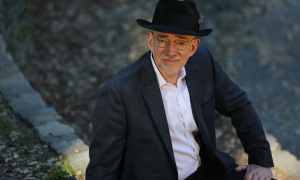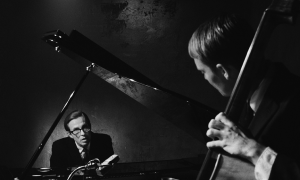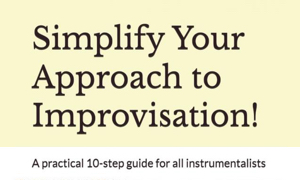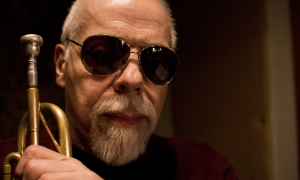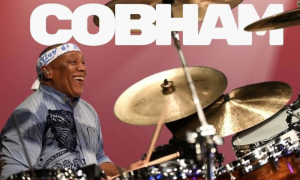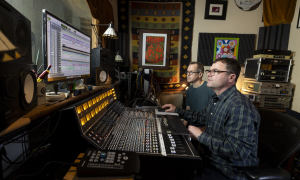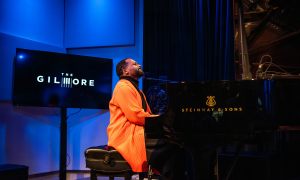
There's always plenty of talk about musicians who had an enormous impact on jazz's direction. From Coleman Hawkins and Lester Young to Charlie Parker, Kenny Clarke, Miles Davis, Horace Silver, Lennie Tristano, Shorty Rogers, Sonny Rollins, Clifford Brown, Bill Evans, John Coltrane and beyond. Always skipped over, for some reason, is Ahmad Jamal.
Now Fresh Sound has released an extraordinary two-CD box that is sure to get you to reconsider: Ahmad Jamal's Three Strings: The Complete Okeh, Parrot & Epic Sessions 1951-1955. The music that turned Miles Davis's head around some 70 years ago still sounds extraordinary. While Bill Evans often is credited with launching the conversational piano trio, that honor really belongs to Ahmad. Evans merely perfected it. As Ahmad plays, you can hear him feeding his guitarist and bassist ideas or them feeding him harmony lines to play off of.
Ahmad was born in Pittsburgh, Pa., and began playing piano at age 3, with lessons starting at 7. Ahmad told me in 2013 that his spare approach on the piano and fondness for the upper range of the keyboard was most influenced by orchestral sensibilities. His first job out of high school in 1947 was with George Hudson's band. In early 1948, he joined a group called the Four Strings.
When one of the musicians left, Ahamd moved to Chicago and played locally. He formed the Three Strings in 1951 with guitarist Ray Crawford and bassist Eddie Calhoun. The relaxed chamber feel of the ensemble was a hit at local lounges and clubs, and soon caught the ear of executives at Okeh Records. The trio recorded four songs for the label in October 1951.
Next came the recording of four sides for Epic in May 1952, followed by four for Parrot in January 1954 and the trio's first album, Ahmad Jamal Plays (Parrot) and second, Ahmad Jamal Trio (Epic), in October 1955. From 1950 to 1952, the group's bassist was Calhoun. Richard Davis took over on bass from 1953-1954 and then Israel Crosby in 1954.
As I wrote in my Wall Street Journal essay in 2013:
Mr. Jamal's distinctive style—melodies played on the piano's upper-most notes combined with elegant and brief mid-keyboard chord clusters—had been revered by jazz musicians since his first recordings in 1951. Miles Davis so admired Mr. Jamal's lyrical, space-rich approach on “Surrey With the Fringe on Top," “A Gal in Calico," “Billy Boy" and other early recordings by the pianist that he had Red Garland record them virtually the same way. The Ahmad Jamal Trio's conversational approach also left a lasting impression on many pianists, including Oscar Peterson, Red Garland, Bill Evans, Phineas Newborn Jr. and Herbie Hancock.
What's more, I Don't Wanna Be Kissed was clearly used as the basis for Gil Evans's arrangement for Davis on Miles Ahead in 1957. Think about it. Ahmad's piano style had so knocked out Davis that he had Red Garland copy them for his group, almost note for note, and had Evans use Ahmad's recording as a reference track. David didn't have Garland interpret Ahmad's approaches but play them almost identically.
When I asked Ahmad whether Davis had tried to recruit him for his quintet in the mid-1950s, he said Davis hinted about it but that the request was absurd: “I was the leader of a group just like Miles. I was doing fairly well financially with my group and there was no incentive for me. Why would I give up calling my own shots with what I had?" True enough.
The other thing about Jamal and his early Three Strings trios is there wasn't a bad song in all 37 recordings. Song after song is beautiful and elegantly arranged and executed. Like Miles Davis, Jamal had great respect for space
By leaving this impression on Davis, one can argue that Ahmad also inspired the trumpeter to take on pop songs, a move that led Davis to be signed by George Avakian at Columbia in 1956. Slice that any way you wish, but this accomplishment alone makes Ahmad a major jazz influencer. Ahmad would become even more refined after 1956, when he formed a traditional trio with Crosby on bass and Walter Perkins on drums. His 1958 album, But Not for Me, recorded live at Chicago's Pershing Lounge, would appear on the Billboard best-sellers chart for 107 weeks.
If you're unfamiliar with Ahmad, this box is the place to start. The music has been remastered and Jordi Pujol has authored a well-researched and highly informative 24-page booklet loaded with superb photos and other graphics. As you'll hear, Ahmad deserves to be on that master list of modern-jazz game-changers.
Here's Jamal with Israel Crosby on bass and Vernell Fournier on drums on CBS's broadcast of Jazz From Sixty-One in 1960 playing Darn That Dream. See how many jazz legends you can pick out standing around the piano...
Now Fresh Sound has released an extraordinary two-CD box that is sure to get you to reconsider: Ahmad Jamal's Three Strings: The Complete Okeh, Parrot & Epic Sessions 1951-1955. The music that turned Miles Davis's head around some 70 years ago still sounds extraordinary. While Bill Evans often is credited with launching the conversational piano trio, that honor really belongs to Ahmad. Evans merely perfected it. As Ahmad plays, you can hear him feeding his guitarist and bassist ideas or them feeding him harmony lines to play off of.
Ahmad was born in Pittsburgh, Pa., and began playing piano at age 3, with lessons starting at 7. Ahmad told me in 2013 that his spare approach on the piano and fondness for the upper range of the keyboard was most influenced by orchestral sensibilities. His first job out of high school in 1947 was with George Hudson's band. In early 1948, he joined a group called the Four Strings.
When one of the musicians left, Ahamd moved to Chicago and played locally. He formed the Three Strings in 1951 with guitarist Ray Crawford and bassist Eddie Calhoun. The relaxed chamber feel of the ensemble was a hit at local lounges and clubs, and soon caught the ear of executives at Okeh Records. The trio recorded four songs for the label in October 1951.
Next came the recording of four sides for Epic in May 1952, followed by four for Parrot in January 1954 and the trio's first album, Ahmad Jamal Plays (Parrot) and second, Ahmad Jamal Trio (Epic), in October 1955. From 1950 to 1952, the group's bassist was Calhoun. Richard Davis took over on bass from 1953-1954 and then Israel Crosby in 1954.
As I wrote in my Wall Street Journal essay in 2013:
Mr. Jamal's distinctive style—melodies played on the piano's upper-most notes combined with elegant and brief mid-keyboard chord clusters—had been revered by jazz musicians since his first recordings in 1951. Miles Davis so admired Mr. Jamal's lyrical, space-rich approach on “Surrey With the Fringe on Top," “A Gal in Calico," “Billy Boy" and other early recordings by the pianist that he had Red Garland record them virtually the same way. The Ahmad Jamal Trio's conversational approach also left a lasting impression on many pianists, including Oscar Peterson, Red Garland, Bill Evans, Phineas Newborn Jr. and Herbie Hancock.
What's more, I Don't Wanna Be Kissed was clearly used as the basis for Gil Evans's arrangement for Davis on Miles Ahead in 1957. Think about it. Ahmad's piano style had so knocked out Davis that he had Red Garland copy them for his group, almost note for note, and had Evans use Ahmad's recording as a reference track. David didn't have Garland interpret Ahmad's approaches but play them almost identically.
When I asked Ahmad whether Davis had tried to recruit him for his quintet in the mid-1950s, he said Davis hinted about it but that the request was absurd: “I was the leader of a group just like Miles. I was doing fairly well financially with my group and there was no incentive for me. Why would I give up calling my own shots with what I had?" True enough.
The other thing about Jamal and his early Three Strings trios is there wasn't a bad song in all 37 recordings. Song after song is beautiful and elegantly arranged and executed. Like Miles Davis, Jamal had great respect for space
By leaving this impression on Davis, one can argue that Ahmad also inspired the trumpeter to take on pop songs, a move that led Davis to be signed by George Avakian at Columbia in 1956. Slice that any way you wish, but this accomplishment alone makes Ahmad a major jazz influencer. Ahmad would become even more refined after 1956, when he formed a traditional trio with Crosby on bass and Walter Perkins on drums. His 1958 album, But Not for Me, recorded live at Chicago's Pershing Lounge, would appear on the Billboard best-sellers chart for 107 weeks.
If you're unfamiliar with Ahmad, this box is the place to start. The music has been remastered and Jordi Pujol has authored a well-researched and highly informative 24-page booklet loaded with superb photos and other graphics. As you'll hear, Ahmad deserves to be on that master list of modern-jazz game-changers.
Here's Jamal with Israel Crosby on bass and Vernell Fournier on drums on CBS's broadcast of Jazz From Sixty-One in 1960 playing Darn That Dream. See how many jazz legends you can pick out standing around the piano...
This story appears courtesy of JazzWax by Marc Myers.
Copyright © 2026. All rights reserved.







